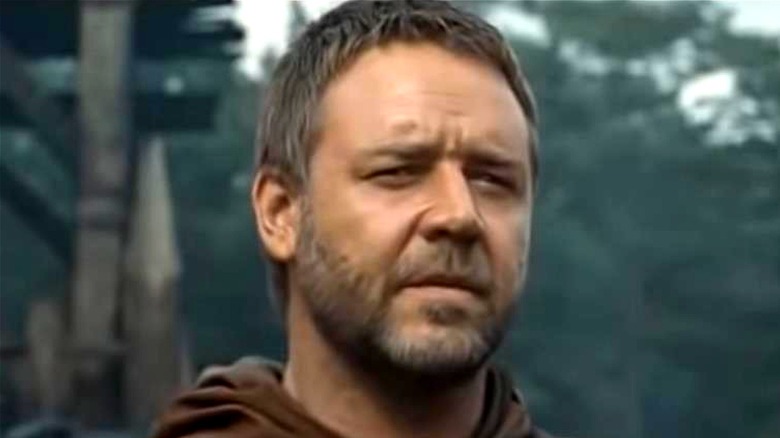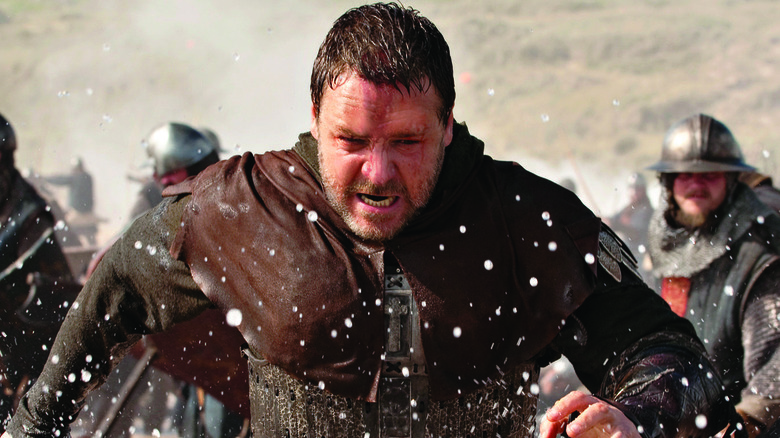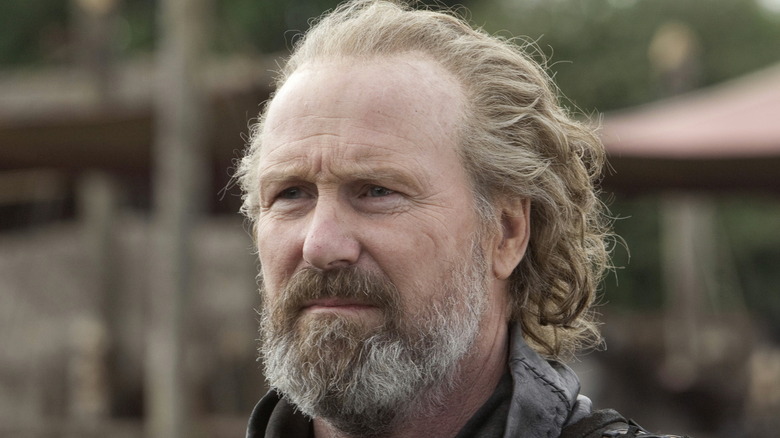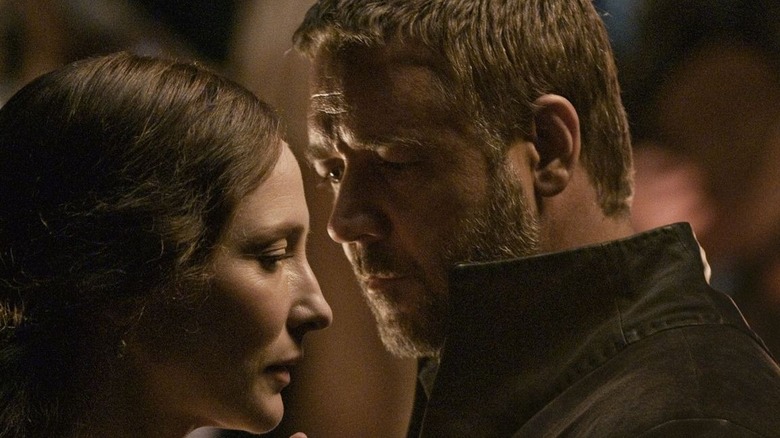How Historically Accurate Is Russell Crowe's Robin Hood?
He's one of the most well-known vigilantes from medieval history and struck down foes with a bow and arrow long before Oliver Queen or Clint Barton made it look good. A legend of British folklore, "Robin Hood," the outlaw that robbed the rich to give to the poor, has made it to the big screen in many forms over the years. Errol Flynn, Sean Connery and (most notably) Kevin Costner all had a hand at the role of the law-dodging archer, with Taron Egerton being the most recent to tackle the part in 2018 albeit in a box-office bomb that has a Rotten Tomatoes of 15%.
Sandwiched between his take and the one that came with a Bryan Adams earworm of a song, though, was Ridley Scott's gritty and grounded adaptation of Robin of the Hood in 2010, starring Russell Crowe. Wielding all the key ingredients to give us another Gladiator, the result was quite the opposite. While not necessarily leagues ahead critically as the Egerton affair (the Rotten Tomatoes rating etches ahead with a critic score of 43%), it certainly looked and felt closer to the era and the world in which "Robin Hood" was seemingly set. But just how close to the real thing was Crowe's version, and regardless of its ranking in popular versions of the character, was it more on target than we think?
Are you for real Robin Hood?
The first thing to clarify in this history lesson is even with all the various exploits of fighting in the crusades, meeting King Richard the Lionheart, and causing trouble for the Sheriff of Nottingham, Robin would've struggled with all of it — on account of not being a real person. While there are various legends of this titular tree-inhabiting hero, the name of Robin Hood actually holds more truth than the person. History Extra states that during the 13th century, "Robin Hood" was a title for criminals and thieves, suggesting that one crime more than most earned them the moniker: robbing.
However, credit to Scott's interpretation is due concerning the social status of Crowe's heroic protagonist. While often shown as a lord of high birth in other films, the 2010 version had this Robin as the son of a stonemason who went against the greater powers that ruled England and became a fugitive. Evidence confirms that lower-class members of society went against laws of the land owned by those further up the ladder and were admired by the poor because of it, winning their favor, much like Crowe's arrow-firing hero.
An issue with time and space
While the problem of a real Robin not being 100% legit can be altered with some creative flair, some errors in Scott's film that could've been avoided and weren't were that of the historical era where his "Robin Hood" takes place. A rule that's broken time and time again in films, this particular offense had Crowe's protagonist buddying up with King Richard (played here by William Hurt), which, while a common trope in the hero's numerous adaptations, couldn't have happened when this version happens. The film opens in 1199, with Robin in Jerusalem under the command of the king, but the Lionheart had actually left seven years prior to this. By 1199, he was in France, where he died of a gangrenous arrow wound, and not during a castle siege.
Although the timing might be a tad off for King Richard's escapades creatively, one thing that was praised was the accuracy in prop design. Speaking to The Guardian in 2010, the bowyer Steve Ralph that trained Crowe in archery, explained that the army Robin and his English allies were up against in the film were carrying the right gear. Crowe's bows were lined with bone and sinew that he'd seemingly brought back from the Crusades, as they were the go-to ingredients for Arabic armories during that time.
Crowe's accent? Not in Nottingham
Besides being criticized for its rather mundane story and lack of excitement from Scott's iteration, the one issue that audiences and critics alike picked up was trying to figure out where on earth Crowe's Robin was from. Through the film, Robin goes to sounding from Scottish, Irish, to English and back again. While his co-star Cate Blanchett's accent fit the part, Crowe's input was almost distracting for most of the film. Much to the actor's frustration, the issue was eventually brought to his attention after the film's release when Crowe left an interview after being asked why his character had an Irish inflexion. Only seven years later, after being called out on Twitter, the actor finally put the issue to bed.
In 2018, a film fan tweeted, "Of all the great showbizz mysteries that remain unsolved .... possibly the greatest ....what the f**k is Russell Crowe's accent in Robin Hood?" Crowe responded with a fact dump that his fans were happy to support: "A child born in Barnsley, on his father's death, taken to France at age 6, travels across Europe to the Middle East on foot, fights in the third crusade for Richard I, alongside men from all parts of Britain, Ireland and France & finally returns to England a man in his 40s." Not a bad attempt at a mic drop, if it weren't for the film having Robin born in Barnsdale, 14 miles south of Barnsley.
Ultimately, for every tear in the timeline Crowe and Scott's second epic endeavor had, there were the odd few elements that made "Robin Hood" close to the medieval material that inspired it. Maybe the next brave soul that takes on this legendary hero can steal some of its more successful elements to deliver better results; it is what Robin Hood's famous for, after all.



